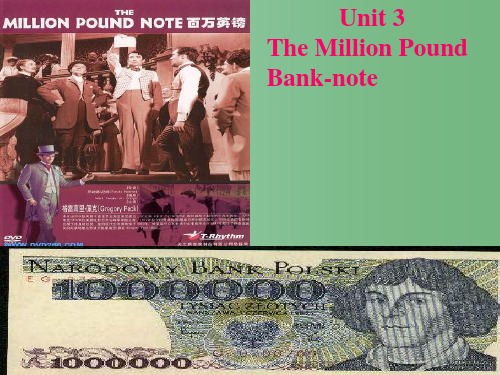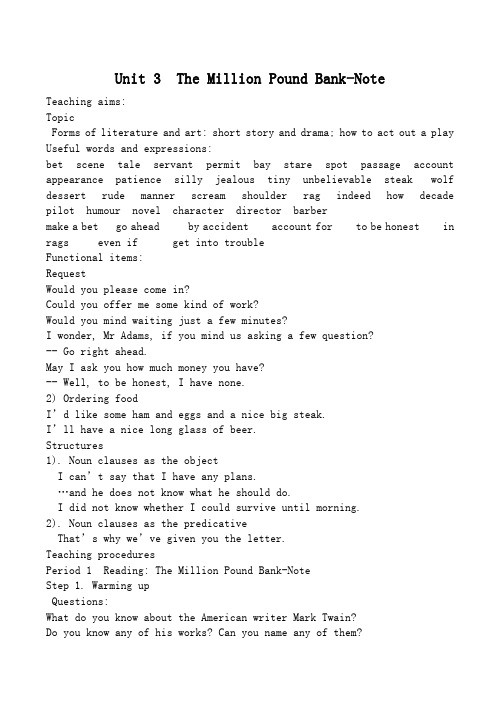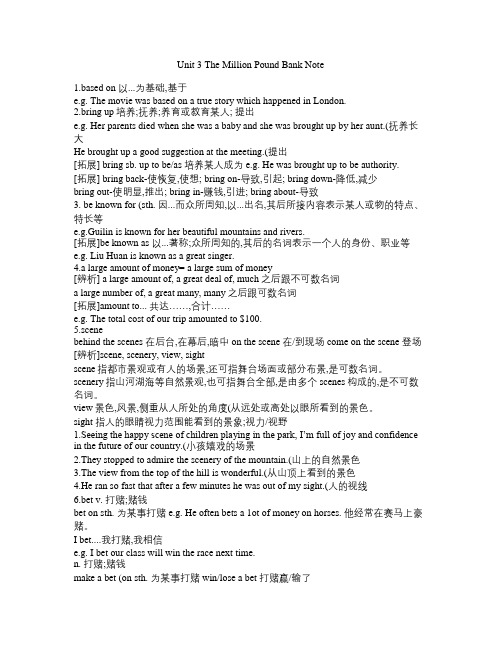人教版高中英语必修三Unit3TheMillionPoundBank-Note课文知识点解析.docx
人教版必修三Unit3TheMillionPoundBankNote单元概述教学目标及评价方法

单元主题:人教版必修三Unit3 The Million Pound Bank Note一、单元概述:在下面空格处简要介绍这个单元,清晰简洁地介绍这个单元的主要教学内容、教学过程和学习活动。
本单元选自必修三第三单元The Million Pound Bank Note,主要内容是根据马克吐温的短篇小说《百万英镑》改变的戏剧剧本。
透过对这一戏剧有关信息的收集和整理,提高学生的信息素养,了解马克吐温的生平和作品风格,引发学生的批判性思维,提高学生文学修养和欣赏水平,探讨金钱和人性的关系,树立正确的价值观和人生观。
在英文短剧表演中,锻炼学生交流和合作的能力,同时考察学生在原作品的基础上的创新能力。
在本单元的教学过程中,先把学生分成8人学习小组进行学习。
具体步骤如下:第一步:组织学生利用因特网等多种信息资源,完成信息收集和整理,包括作者生平、主要作品以及写作风格、《百万英镑》故事情节、以及戏剧的特点等有关信息,小组讨论交流,形成初步观点。
通过班级讨论,教师使用思维导图,补充完善信息。
第二步:组织学生观看电影《百万英镑》中,本单元内容所涉及到的片段,观看之前布置学习任务,如找出每一场中的戏剧冲突、用批判性的思维思考戏剧背后的社会现象,回答与课文相关的简单问题等。
第三步:成果展示。
利用所掌握内容,可以采用读后感的形式进行展板展示,也可以小组活动,进行英文短剧表演,可以进行适当的创新改编,要求尽量使用本单元新词汇,注意戏剧语言和动作的使用。
二、21世纪技能这个单元将重点培养哪种或哪些21世纪技能:信息素养交流和合作批判性思维创造力和创新三、课程标准与教学目标(模块4第1节后完成)请明确单元的课程标准(课程标准要来自于现行课标)和教学目标。
教学目标应与课程标准相联系,并体现21世纪技能。
课程标准语言技能目标(七级)听:1.能识别语段中的重要信息并进行简单推断;2.能听懂正常语速听力材料中对人和物的描写、情节发展及结果。
高中英语 Unit3 The Million Pound Bank Note课件 新人教版必修3

2. How many characters are ? Who are they? And
who’s the hero(main character)?
Four.
Henry, Roderick, Oliver, Servant. 3.Where did Henry e from?
Henry
San Francisco of the US.
12.What was Mark Twain’s life like in the last years of his life?
The last years of his life were filled with sad events, loneliness, and the loss if much money.
Careless
didn’t sail his boat well and might have died if the ship had not seen him.
The characteristics of the two
brothers:
some servants and a big house
working as an unpaid hand.
GroGurpouwp owrokrk
Character’s lines(台词) tell us what they are like. We can know more about the main characters only after we study their lines carefully.
The Million Pound Bank-Note
Fast-reading: answer the following questions.
人教版英语必修3 Unit3 The Million Pound Bank-Note

Unit 3 The Million Pound Bank-NoteTeaching aims:TopicForms of literature and art: short story and drama; how to act out a play Useful words and expressions:bet scene tale servant permit bay stare spot passage account appearance patience silly jealous tiny unbelievable steak wolf dessert rude manner scream shoulder rag indeed how decade pilot humour novel character director barbermake a bet go ahead by accident account for to be honest in rags even if get into troubleFunctional items:RequestWould you please come in?Could you offer me some kind of work?Would you mind waiting just a few minutes?I wonder, Mr Adams, if you mind us asking a few question?-- Go right ahead.May I ask you how much money you have?-- Well, to be honest, I have none.2) Ordering foodI’d like some ham and eggs and a nice big steak.I’ll have a nice long glass of beer.Structures1). Noun clauses as the objectI can’t say that I have any plans.…and he does not know what he should do.I did not know whether I could survive until morning.2). Noun clauses as the predicativeThat’s why we’ve given you the letter.Teaching proceduresPeriod 1 Reading: The Million Pound Bank-NoteStep 1. Warming upQuestions:What do you know about the American writer Mark Twain?Do you know any of his works? Can you name any of them?Step 2. Pre-readingSs discuss and answer the following questions:Have you ever argued with your friends? What do argue about?If you can’t agree with each other, how do y9u end up your argue? Have you ever made a bet with a friend? If so, what’s the result? Can you tell us the details?与话题相关的词语play novel autobiographytragedy short story novelistcomedy medium-length novel writerhistorical play science fiction playwright /dramatista play of five actsoperaStep 3. While-readingFirst reading: Read scene 3 and answer the following questions:Where does Henry Adams come from? Does he know much about London?What did he do in America?Why did he land in Britain?Put the following events in correct order.Henry wondered in London streets.About a month age Henry Adams was sailing out of the bay.The next morning he was spotted by a ship.Towards nightfall he found himself carried out to sea by a strong wind. On the ship he earned his passage by working as an unpaid hand.A. 2) 3) 4) 1) 5)B. 2) 4) 3) 5) 1)C. 5) 2) 3) 4) 1)D. 1) 4) 3) 5) 2)5. Why did the narrator say “you’re about to hear the most incredible tale”?A. Because Henry Adams survived at sea.B. Because Henry Adams earned his passage by working as an unpaid hand.C. Because Roderick and Oliver invited Henry to step in and asked him questions.D. Because Henry Adams, a tramp, was given some money for reasons unknown to himRead scene 4 and answer the following questions:6. What does “it’ll cost a tiny bit” exactly mean?7. At the sight of the customer’s note, the owner and his waiter got very_______.A. frightenedB. angryC. worriedD. excited8. When did the hostess and the waiter change their attitude to the customer?A. At the beginning of the story.B. Before they saw the large note.C. At the end of the story.D. After they saw the large note. Second reading: read and fill the following formStep 4. After-readingDo you think it is a credible tale?If you get a surprising sum of money by buying lottery tickets, what do you want to do with the money most?Period 2. (Language learning and grammar)Step 1. RevisionSs retell scene 3 and scene 4 their own words.Step 2. Language points1. a large quantity of money = a large sum of money“许多,大量”的短语归纳:make a bet on sth. with sb. = bet on sth. with sb.He made a bet that he would reach the summit before any of the others.3. permit sb. to do sth.permit doing sth.permit /allow /letWe do not permit smoking in the office.We are not permitted to use his computer.4. find oneself carried out to seafind oneself + prep./p.p /-ing“发现某人自己不知不觉…..”He found himself walking in the direction of the park.5. spot: v. 认出 n. 斑点;场所,地点She was spotted by the police boarding a plane for Pairs.Which has spots, the leopard or the tiger?This is the very spot where he was murdered.6. account for1) explain the cause of sth. 解释谋事的原因2) to make up an amount of sth. 占..比例We can now easily account for many things which were thought to be mysterious by the ancients.According to Holowka, buildings account for 65% of total US electricity use.7. by accident = by chanceI only found it by accident.8. to be honest= to tell you the truth= honestly speakingTo be honest, I don’t think we have a chance of winning.9. foolish / silly /stupid10. probably / possibly / perhaps / maybe11. pretend to bepretend to dopretend to be doingpretend to have done12. take a /one’s chance of doing sth. 冒险,碰运气Step 3 Learning about languageSs do part 1 of the discovering useful words and expressions。
人教版高中英语必修三unit3TheMillionPoundBandNote课文详解

人教版高中英语必修三unit3TheMillionPoundBandNote课文详解必修三Unit 3 The Million Pound Band Note百万英镑Act I, Scene 3Narrator: It is the summer of 1903.这是1903年的夏天。
Two old and wealthy brothers, Roderick and Oliver, have made a bet.两个年迈而富有的兄弟:罗德里克和奥利弗,进行打赌。
【注释:make a bet 打赌eg. I’m good at making a bet on football 310.我擅长打足彩310。
】Oliver believes that with a million pound bank note a man could survive a month in London.奥利弗认为一个拥有一百万英镑支票的人能在伦敦生存一个月。
【注释:survive vi.幸存, 活下来eg. These plants cannot survive in very cold conditions.这些植物在严寒中不能存活。
】His brother Roderick doubts it.他的哥哥对此怀疑。
At this moment, they see a penniless young man wandering on the pavement outside their house.就在这时,他们看见一位身无分文的年轻人正在他家外的人行道上徘徊。
【注释:on the pavement徘徊街头,没有住处,被遗弃;wandering adj. 漫游的;闲逛的;(精神)恍惚的;错乱的eg. 1) wandering thoughts 错乱的思想2) I felt my attention wandering during the lecture.我感到听讲座时老走神。
人教版高中英语必修三Unit_3《The_Million_Pound_Bank-Note》说课稿课件

Oliver believes that with a million pound bank note a man could survive a month in London. I wonder, Mr Adams, If you’d mind us asking a few questions. May we ask what you’re doing in this country and what your plans are?...
Act Two Scene 1 练习册的“Talking”部分 Scene 2 练习册的“Listening”部分 Scene 3 练习册的“Listening task”部分 Scene 4 练习册的“Reading and speaking”部分
四、教学建议---课时安排
Period 1 Period 2 Period 3 Period 4 Period 5 Period 6
5. LISTENING TASK 包括听第二幕的第三场,讨论并写下听力部分的续文。 6. READING AND SPEAKING TASK 阅读并表演剧本的第二 幕的第四场。
7. WRITING TASK
*8. PROJECT
9. CHECKING YOURSELF
(三)剧本的整体安排:
Act One Scene 1&2 教师教学用书的附录部分 Scene 3 学生用书的“Reading”部分 Scene 4 学生用书“语言运用”的“Reading, acting and speaking”部分 Scene 5 学生用书“语言运用”的“Listening, writing and acting”部分
新人教版高中英语必修三 Unit 3 The Million Pound Bank Note课件

buy a big flat
In the following story, after Henry had been given a large amount of money, things changed…
Pre-reading
What would happen to Henry at A.tHheerwesatasunroatntt?aken seriously. B. He was treated politely.
Waiters were s__h_o_c_k__edand doubted if it was _g_e_n_u__in__e.
They all _b_o_w__e__d_ as Henry
left.
Careful reading task two
T
1.
The owner looked down upon Henry when he noticed Henry’s appearance.
and after he showed _b_a_n_k_n_o_te_____
Careful reading
Fill in the blanks.
At a restaurant
During the meal
task one
Henry ordered some ham, eggs,
a nice big _s_t_e_a_kand a pineapple d__e_s_s_e_r_t first.
orders would cost a lot of money?____A_
A.Because he was afraid Henry didn’t have enough money.
人教版高中英语必修三Unit3themillionpoundbanknote[阅读]
![人教版高中英语必修三Unit3themillionpoundbanknote[阅读]](https://img.taocdn.com/s3/m/e206911a915f804d2b16c1f2.png)
D. Towardsnightfallhefoundhimselfcarriedouttose abyastrongwind.
E. Ontheshipheearnedhispassagebyworkingasanu npaidhand.
C. BecauseRoderickandOliverinvitedHenrytos tepinandaskedhimquestions.
D. BecauseHenryAdams,atramp,wasgivensom emoneyforreasonsunknowntohim.
Nowdotheexercisesinthetextbook
MainCharacters
CharactersinScene3: HenryalostAmericanbusinessmaninLondon RoderickarichEnglishman,Oliver’sbrother OliverarichEnglishman,Roderick’sbrother Servanttothebrothers CharactersinScene4: PortiaOliver’sdaughter Mr.Clemensadinerintherestaurantandexpertonban
高中英语课件
madeofcanruohanxing
Unit3TheMillionPoundBank-note
TheMillionPoundBank-Note
TheMillionPoundBank-Note
Apenniless(poor)andlostyo ungAmericaninLondonbeco mesthesubjectofabetbetwe entworichandeccentric(古 怪 的)Englishgentlemen.They wanttoknowhowapoormand oandlivewithamillionpoundn ote.Andaseriesoffunnything shappened.
人教版高一英语必修3 unit3 The Million Pound Bank Note 重点词汇总结

Unit 3 The Million Pound Bank Note1.based on 以...为基础,基于e.g. The movie was based on a true story which happened in London.2.bring up培养;抚养;养育或教育某人; 提出e.g. Her parents died when she was a baby and she was brought up by her aunt.(抚养长大He brought up a good suggestion at the meeting.(提出[拓展] bring sb. up to be/as 培养某人成为 e.g. He was brought up to be authority. [拓展] bring back-使恢复,使想; bring on-导致,引起; bring down-降低,减少bring out-使明显,推出; bring in-赚钱,引进; bring about-导致3. be known for (sth. 因...而众所周知,以...出名,其后所接内容表示某人或物的特点、特长等e.g.Guilin is known for her beautiful mountains and rivers.[拓展]be known as 以...著称;众所周知的,其后的名词表示一个人的身份、职业等e.g. Liu Huan is known as a great singer.4.a large amount of money= a large sum of money[辨析] a large amount of, a great deal of, much之后跟不可数名词a large number of, a great many, many之后跟可数名词[拓展]amount to... 共达……,合计……e.g. The total cost of our trip amounted to $100.5.scenebehind the scenes 在后台,在幕后,暗中 on the scene 在/到现场come on the scene 登场[辨析]scene, scenery, view, sightscene指都市景观或有人的场景,还可指舞台场面或部分布景,是可数名词。
- 1、下载文档前请自行甄别文档内容的完整性,平台不提供额外的编辑、内容补充、找答案等附加服务。
- 2、"仅部分预览"的文档,不可在线预览部分如存在完整性等问题,可反馈申请退款(可完整预览的文档不适用该条件!)。
- 3、如文档侵犯您的权益,请联系客服反馈,我们会尽快为您处理(人工客服工作时间:9:00-18:30)。
高中英语学习材料***鼎尚图文理制作***Unit 3 The Million Pound Bank-Note 课文知识点解析Warming up1.A rich person gives you a large amount of money to use as you like.What will you do with it?一个富人给了你一大笔钱,让你随便花,你打算怎么办呢?(1)a large amount of sth. (不可数名词):大量的,大笔的……e.g.a large amount of work/money/furniture大量的工作/钱/家具比较:A large amount of money was spent on the bridge.(谓语动词用单数)Large amounts of money were spent on the bridge.(谓语动词用复数)建这座大桥花了一大笔钱。
注意:“the amount of+不可数名词”表示“……的总数、总额、总值”。
(2) as you like“按照你喜欢的方式”,as conj.是连词,引导方式状语从句。
e.g.Leave the room as it is.房间的东西不要动。
Do as I told you to.按照我的要求去做。
(3)do sth. with sth. 主要用于疑问句中,与what配合使用,意思是“处理、对付,安排”。
e.g.What have you done with my umbrella?你把我的伞放哪里去了?What are we going to do with the food left over from the party?我们宴会上剩下的食物怎么办呢?She doesn’t know what to do with herself.她不知道怎么办才好。
What will you do with this kind of letter?你打算怎么处理这封信呢?2.Have you ever made a bet with a friend?你和朋友打过赌吗?make a bet 打赌He made a bet with me on whether the famous actress would come. 思维拓展a large amount of/a great deal of/a little/a bit of 这些词后都跟不可数名词。
a great/good many/a large number of 后只能跟可数名词。
a lot of/lots of/plenty of/a large quantity of/large quantities of 后既可跟可数名词,又可跟不可数名词。
思维拓展as conj.还可以有其他用法:当……时/在……期间e.g.I watched her as she combed her hair.她梳头的时候我一直看着她。
思维拓展deal with 处理、对付e.g.What’s the best way to deal with the grammar points?处理这个语法点的最好办法是什么?deal with 在疑问句中与how搭配。
e.g.How to deal with the waste is still a problem.如何处理这些垃圾还是个问题。
思维拓展bet v. 打赌、赌博e.g.I don’t enjoy betting.我不喜欢赌博。
He spent all his money on horses. 他把所有的钱都用在赌马上。
I bet that...= I’m sure that...我敢肯定……他和我打赌,赌那位有名的演员是否会来。
相似短语:win a bet 打赌而赢了lose a bet 打赌而输put/place a bet on a horse 在一匹马上下赌注e.g.How did you feel about the bet if you lose it?如果这次赌博你输了,你觉得赌博如何?have a bet on sth. 赌博……People in Hong Kong like having a bet on horse races. 香港人喜欢在马的比赛上下赌注。
3.If so,what do you think of it?如果你读过这本书或看过这场电影,你觉得它怎么样?What do you think of sth.?=How do you like/find sth.?表达个人看法“你认为某事怎么样?”e.g What do you think of my clothes?你认为我的衣服怎么样?Reading Act One1.Scenes 1 and 2 are provided in Teacher’s Book.第一幕和第二幕看教师用书。
provide sb. with sth./provide sth.for sb.给某人供应/提供某物My company provided me with a car.我的公司给我配备了一辆车。
Can you provide accommodation for me?你能为我提供食宿吗?The painting provides us with one of the earliest examples of the use of perspective.那幅画给我们提供了采用透视画法的最早的范例。
2.Now,ladies and gentlemen,you are about to hear the most incredible tale.女士们,先生们,你马上要听到最令人不可思议的故事。
be about to do sth. 立刻要做某事,马上要做某事(在此结构中,没有时间状语)误:He is about to start soon/at 2 a.m.正:He is about to start.be about to do 使用的典型句式:was/were about to do when....“正打算……这时……”e.g.I was about to leave home when something unexpected happened.我正打算离家这时发生了意想不到的事情。
3.It is the summer of 1903,and Henry Adams,an American businessman,has had some very bad luck.这是1903年的夏天,一个美国商人亨利·亚当斯,遇到了一些思维拓展I think the movie is interesting. What do you think of it?=How do you like it?思维拓展类似的短语有:supply sth. to sb./supply sb. with sth. 供给或供应某人所需或可用的物品;向某人提供某物e.g.The company supplies consu- mers with gas,electricity,etc. 这家公司向客户提供煤气、电等。
思维拓展be about to do 这是将来时的一种表达法,但不能与tomorrow,next moment,right away 等表示时间的状语连用。
思维拓展good luck (to sb.)祝某人好运和顺利e.g.—I’m going to take the examination for the entrance of college.我要参加高考了。
—Good luck.祝你好运。
(祝你考试成功。
)bad luck 倒霉,不走运,遗憾麻烦。
has bad/poor/little/hard luck 运气不好、欠佳have good luck 运气好e.g.I had the good luck to find a job immediately I left school.我很幸运,一毕业就找到了工作。
luck n. [U] 运气,造化I hope good luck will be with you forever.我希望好运永远陪伴你。
4.He is lost in London.他在伦敦迷路了。
lose vt. 丢失,迷失be lost in...(1)(在城市、森林、人群中)迷路e.g.He is lost in the forest.他在森林里迷了路。
He is lost in the crowd and didn’t know where to go. 他在人群中迷了路,不知该往哪里走。
(2)专心致志于……Lost in thought,he almost ran into a tree.沉思之中,他差一点撞到前面的树。
5.Walking down the street,he hears someone calling him. 正在街上流浪,他听到有人叫他。
hear sb. doing sth. 听见某人正在干某事e.g.I heard the girl singing in the house.我听见那个女孩正在房子里唱歌。
比较:hear sb. do sth. 听见某人做过某事e.g.I heard the girl sing a song yesterday.我昨天听见那个女孩唱了一首歌。
hear sth./sb. done 听见某人/某事被……e.g.I heard my name called in the street.我听到街上有人叫我的名字。
6.Who?Me,sir?谁?我吗,先生?英语里,在简略答语中要用宾格,而不用主格。
e.g.—Who broke the window?谁打破了窗户?—Me.我。
7.Through the front door on you left.通过你左侧的前门。
through 和in有关,表示动作是在某一物体的空间里进行的,翻译成“穿过……”。
e.g.walk through the forest 走过森林flow through the city 流过城市思维拓展lose 构成的一些短语:lose one’s temper发脾气lose one’s shirt 输光所有的钱,赔光本钱lose one’s life 丧生,遇害lose one’s heart 爱上某人思维拓展和hear用法类似的其他感官动词还有:see sb. doing 看到某人正在做某事see sb.do sth. 看到某人做过某事see sth. done 看到某事被做思维拓展简略答语作表语时,一般用宾格形式的代词。
